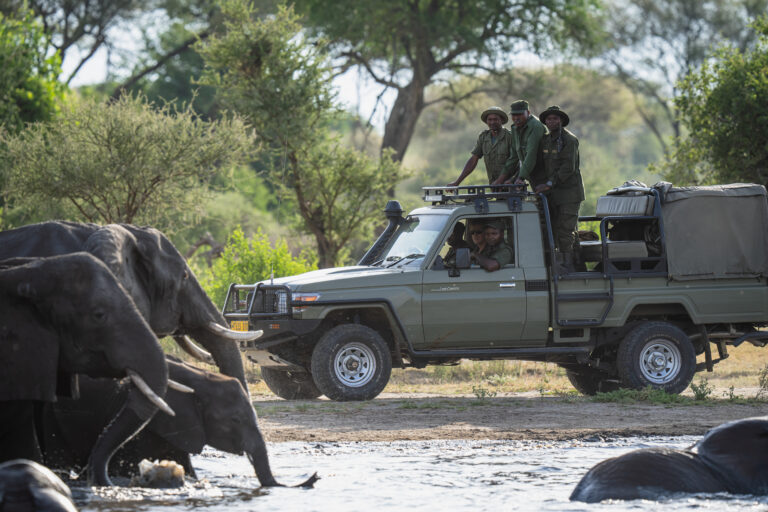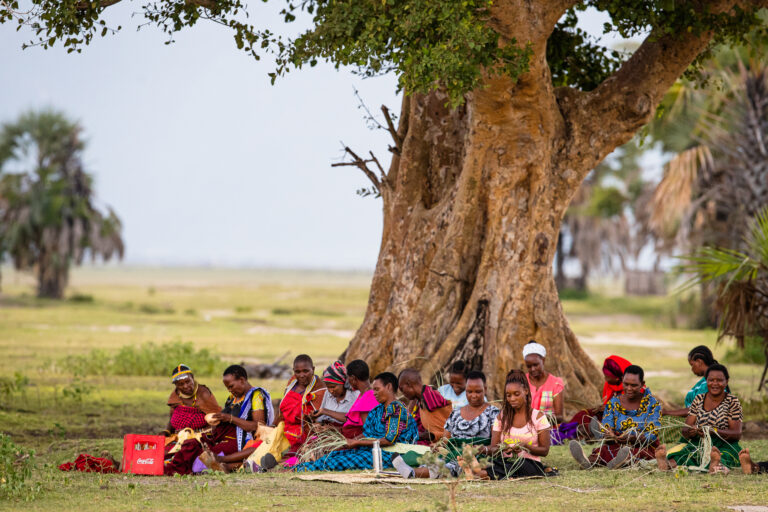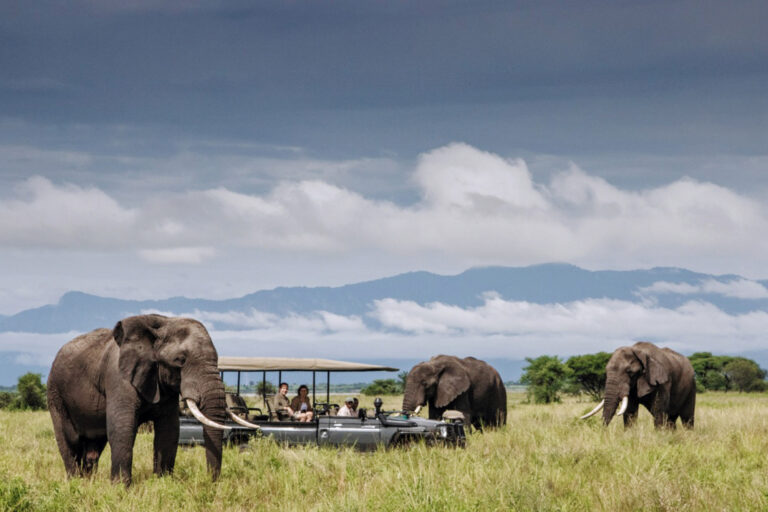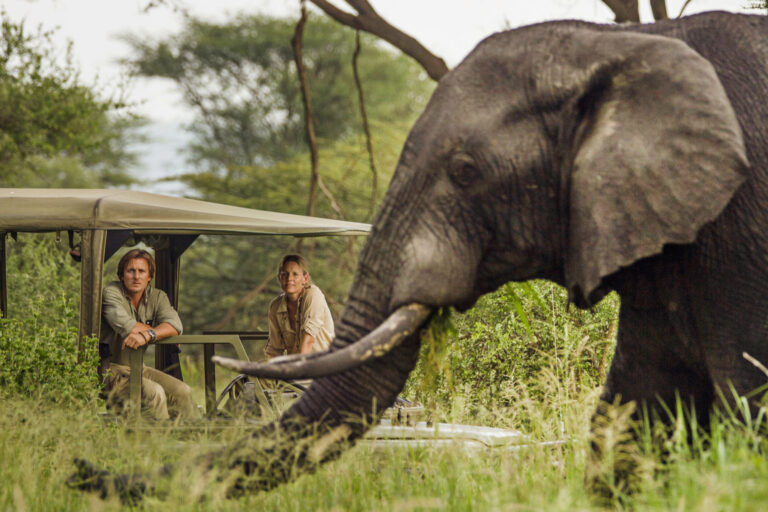Chem Chem Safari Celebrates
Rich Wildlife in Previously Classified ‘Abandoned’ Migration Corridor
Conservation successes, anti-poaching, and community upliftment breathe new life into the ancient wildlife migration route between Tarangire and Lake Manyara national parks
When Fabia Bausch and Nicolas Negre started Chem Chem in 2008, most people thought they were crazy to attempt to conserve a region of Tanzania that was nearly devoid of wildlife. Yet today, the pair own three safari camps and lodges located in a vibrant migration corridor, and most of the guests they host can’t envision the land as anything other than a vast spread of lush vegetation teeming with wildlife. Some of Chem Chem Safari’s most renowned experiences include game drives, big tusker encounters, nature and wellness walks, and even side-by-side runs with a Maasai warrior.
While the conservation work of Chem Chem Safari’s co-founders is far from done, now is a good time to reflect on what they have accomplished over the past 15 years as their operation celebrates a significant victory for wildlife, with the Kwakuchinja Corridor receiving public recognition from the Tanzanian government as one of the few wildlife corridors in the country declared as a model for the remaining 61. This is an especially rewarding acknowledgment for Chem Chem Safari and its nonprofit Chem Chem Association, following a decade-and-a-half of focus on conservation and community empowerment that has enabled wildlife to once again move freely through the corridor and adjacent areas. This victory was made possible through collaboration with multiple government stakeholders, particularly working jointly with local communities, which own the land, toward the goal of making them the agents of change.
Co-founders Fabia Bausch and Nicolas Negre founded Chem Chem Safari and its nonprofit arm, Chem Chem Association
Declared Abandoned
Located within a 50,000-acre spread of wilderness between Tarangire and Lake Manyara national parks in northern Tanzania, the Kwakuchinja Corridor has historically been an important migration route for wildlife in the region. Yet when Bausch and Negre initially envisioned a safari operation, the corridor and the surrounding Burunge Wildlife Management Area (WMA) were almost devoid of native fauna from illegal logging, poaching, and overgrazing. Conditions grew so severe for wildlife that the Tanzanian government declared the corridor ‘abandoned.’ The founders took an interest in the Kwakuchinja Corridor and, from the onset, were determined to restore the corridor to its full glory.

CCA is addressing the most important challenges, including the peaceful coexistence of humans and wildlife.
In 2008, Chem Chem Safari signed a lease agreement with the Burunge WMA to manage the area west of Tarangire National Park. It also launched its philanthropic arm, Chem Chem Association (CCA), to restore the wild beauty of the area. CCA is dedicated to addressing the region’s most important challenges, including the peaceful coexistence of humans and wildlife, by encouraging economic activities that do not compete with wildlife. CCA and the communities are equal partners based on their shared mission to protect and conserve the corridor. In alignment with the Tanzanian government, one of the nonprofit’s first initiatives was establishing a joint anti-poaching unit for the Burunge WMA and the wildlife corridor. Staffed with trained men and women from local communities and conducted in collaboration with Tanzania National Parks (TANAPA) and Tanzania Wildlife Management Authority (TAWA), as well as WMA Village Game Scouts, District Rangers, and Chem Chem Game Scouts, the joint anti-poaching units have been instrumental in the return of wildlife.

Joint anti-poaching units monitor the corridor and the surrounding Burunge Wildlife Management Area.
The Return of Big Tuskers
In 2009, just one year after the initial lease agreement was signed, zebras were spotted at Lake Manyara. Then wildebeest were seen grazing on plains in front of the lake the following year. A multitude of wildlife gradually returned, including giraffes, lions, and warthogs. In 2021, the fruits of CCA’s steadfast work ripened further, with elephants returning to the Kwakuchinja Corridor for the first time in 40 years. Eventually, the famed ‘big tuskers’ – that is, elephants that have survived for over 50 years and have irreplaceable knowledge and experience – returned, too. Tarangire is home to some of the last remaining herds of elephants with tusks that are significantly longer and heavier than those of Savanna elephants.
To further prove the vital significance of the area for wildlife, a lion and five elephants were collared in 2017 to properly monitor their movements and determine whether the corridor was viable. The evidence was clear: The restoration of the Kwakuchinja had commenced, and it was not ‘abandoned’ after all but rather ‘dormant’ and slowly awakening from its slumber.

CCA conservation-focused education programs aim at raising awareness about the importance of wildlife conservation.
Educating Ambassadors for their Environment
With its focus on conservation, working closely aligned with surrounding communities and the Tanzanian government is a fundamental strategy for Chem Chem Association to deliver the best conservation practices to the Tarangire and Manyara ecosystems. A key objective is to ensure that as many children as possible receive conservation education to foster a positive attitude towards wildlife and nature. Concretely, CCA conducts conservation-focused education programs aimed at raising awareness about the importance of wildlife conservation. In 2023 alone, 526 children received comprehensive conservation education.
Perhaps most visibly to local populations, in 2013, CCA established the Chem Chem League Cup with six soccer teams participating from surrounding villages. Each tournament carries a strong conservation message. Now marking its 10th season, an incredible 36 teams participate from the surrounding villages. The league promotes involvement and community interaction in a much-loved sports framework, and its annual six-week tournament typically draws 1,000 spectators from throughout the region. In 2023, the theme of the League Cup was ‘Save our Giraffes.’

The Chem Chem League Cup, now in its 10th season, with 36 soccer teams participating from surrounding villages.
Empowered Guardians
Chem Chem Association’s sustained conservation advocacy has greatly affected local communities that have a combined population of 50,000 people. Over the past 15 years, the nonprofit has continuously redefined how it works with its partners toward the common goal of restoring the Kwakuchinja Corridor. On the one hand, the communities that share the land with Chem Chem benefit from wildlife, yet they also carry the burden of living close to it. To realize the goal of rehabilitation of the region for future generations, it is essential to have a shared vision in which the communities are equal partners. One of CCA’s strategies is to introduce and engage the communities in economic activities that do not compete with wildlife.
Recognizing the integral role that local communities play in sustainable conservation, CCA creates initiatives and programs that foster socio-economic impact. These include training programs and support for horticulture, beekeeping, and the raising of poultry. Offering solutions to strengthen community livelihoods, as well as local culture and knowledge, enables communities to become empowered guardians of their resources.

CCA introduces and engages local communities in economic activities that do not compete with wildlife.
Powerful Partners
Chem Chem Safari created Chem Chem Association in 2008 to spearhead its conservation and community engagement projects. Both work in tandem with the safari operation, which is the voice of responsible tourism. Through its tourism offering, Chem Chem Safari has created over 220 jobs that indirectly support over 3,000 people in the area, making the company the primary employer in the Burunge WMA.
With tourism as powerful tool to help change the perceptions of travelers and generate funds, CCA’s community empowerment and engagement work has drawn support from other partners over the years. For instance, Hand in Hand Tanzania has been critical for community upliftment, empowering community members to become small business owners and entrepreneurs and propel themselves out of poverty.
Alignment and close collaboration with the Tanzania Wildlife Management Authority (TAWA) and Tanzania Wildlife Research Institute (TAWIRI) has bolstered the long-term success of CCA’s conservation mission. Meanwhile, a continuing relationship with the Research Triangle Institute – the implementation arm of USAID – is funding specialized training and capacity-building support for the region’s anti-poaching units to counter a range of human pressures, including illegal cattle grazing, charcoal making, and human-wildlife conflict.
Strong partnerships and collaboration of all stakeholders are the basis for Chem Chem Safari and Chem Chem Association’s key objective: To ensure that the Kwakunchinja Corridor continues to exist for future generations.

Chem Chem Lodge, one of three exclusive safari camps and lodges owned and operated by Chem Chem Safari.
Exploring Close to Nature: Chem Chem’s Slow Safari
Parallel to the strategic conservation work, Chem Chem Safari has opened one luxury safari lodge and two tented camps for travelers to enjoy access to these exclusive-use protected wilderness areas.
Owner-led by co-founders Fabia Bausch and Nicolas Negre, Chem Chem pioneers an experience centered around their ‘Slow Safari’ philosophy. The unique concept emphasizes a tactile, sensory safari that plays out beyond the confines of a vehicle and inspires guests to engage with nature up close and discover the wonders of the African wilderness at their own pace. Making privacy and the personal preferences of guests a high priority, Chem Chem Safari travelers always have exclusive use of a private guide and vehicle, enabling them to explore their interests at leisure.
“Promoting values of love and respect for Tanzania’s delicate ecosystem is a passion we share with our donors, community, family, and friends,” note Bausch and Negre. “We hope that the communities we are working to protect now will continue to build an ever-stronger connection to the land and its wildlife and continue the meaningful conservation work of Chem Chem Association in the future.”

Chem Chem pioneers ‘Slow Safari,’ a unique concept that emphasizes discovering the African wilderness at guests’ own pace.
